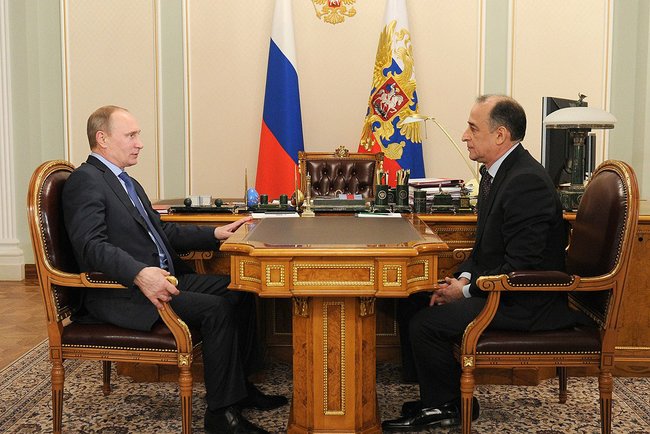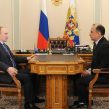
Kabardino-Balkarian Governor’s Resignation Likely Tied to Sochi Olympics
Publication: Eurasia Daily Monitor Volume: 10 Issue: 220
By:

On December 6, the governor of Kabardino-Balkaria, Arsen Kanokov, unexpectedly stepped down from his position. His abrupt resignation spurred speculation among analysts about the reasons and Moscow’s future plans for this North Caucasian republic. The situation in Kabardino-Balkaria is particularly significant because of its connection to the upcoming 2014 Winter Olympics in nearby Sochi. Many members of the republic’s largest ethnic group, the Circassians (a.k.a. Kabardians), oppose the Olympics in Sochi. Circassians say that Russia carried out genocidal policies in the region in 19th century, wiping out the entire population of Circassians who inhabited the area only 150 years ago. Today, Moscow not only refuses to admit past mistakes, but also attempts to efface any traces of the Circassians from the area.
Rumors about Kanokov’s resignation first appeared on the Aheku.org website on December 5 (https://www.aheku.org/news/policy/5014). According to the Novaya Gazeta newspaper, President Vladimir Putin received Kanokov in Moscow on December 4 and told him to resign. That same day, Putin met Kanokov’s longtime rival, police General Yuri Kokov, and asked him to lead the republic (https://www.novayagazeta.ru/inquests/61335.html?fb_action_ids=10153561811345161&fb_action_types=og.recommends&fb_source=other_multiline&action_object_map=%5B1400465660196344%5D&action_type_map=%5B%22og.recommends%22%5D&action_ref_map=%5B%5D).
When Kanokov’s resignation was finally made official on December 6, it came as a shock to many observers. Some Circassian activists welcomed it. Ruslan Kesh asserted that Kanokov had failed to introduce private land ownership and was turning the traditionally secular republic into an Islamic one. Kabardino-Balkarian human rights activist Valery Khatazhukov stated that he “did not expect anything good coming” from Kanokov’s resignation. Khatazhukov’s primary concern was that Moscow was continuing with the practice of appointing governors in the North Caucasus, instead of allowing the residents of the region to elect them through a popular vote (https://www.aheku.org/news/society/5017).
Kanokov himself explained his resignation by the need for a “healthy rotation of personnel” (https://www.interfax.ru/russia/txt.asp?id=345360). Only about a year earlier, in November 2012, Kanokov had expressed a different view of his political future. After Moscow appointed a controversial prime minister for the republic, evidently against the wishes of Kanokov himself, and rumors spread about Kanokov’s pending resignation, the governor of Kabardino-Balkaria declared: “As long as the president of Russian Federation trusts us, I will stay in my present position. I do not have any other plans” (https://sk-news.ru/adygheya/news/authority/23007/). Even after Kanokov’s resignation, the Russian president’s “trust” does not seem to have ended for him entirely: he will reportedly now move to Moscow to represent Kabardino-Balkaria in the Federation Council (upper chamber of Russia’s parliament) (https://newtimes.ru/articles/detail/75481).
A prominent businessman with strong ties to the previous government of Kabardino-Balkaria, Kanokov came to power in the republic in September 2005. He combined politics and business quite successfully, holding various positions starting in 1998, including that of a deputy in the Russian State Duma. At the same time, he climbed Forbes’ ranking of the richest people of Russia, from the 185th position in 2011 to the 156th position in 2013, with his net worth estimated at $650 million in 2013 (https://www.forbes.ru/profile/arsen-kanokov).
Two weeks after Kanokov’s appointment in 2005, Kabardino-Balkaria’s capital of Nalchik was the target of a large-scale rebel attack. The security services’ harsh crackdown on Kabardino-Balkarian society, especially practicing Muslims, which followed the October 2005 events haunted Kanokov throughout his time as governor. Young and popular Muslim leaders like Anzor Astemirov and Musa Mukozhev were driven underground, which radicalized the leaders themselves as well as their supporters. After Astemirov was killed in a police operation in March 2010, the insurgency’s activities in Kabardino-Balkaria skyrocketed. In spring–summer 2011, the bulk of the insurgent leaders in the republic were killed by the Russian security services and the security threats became less acute.
Several Russian experts said Kanokov’s removal from office was connected to the “poor security situation” in the republic. Moscow may have had concerns about the security situation in the republic given the impending Sochi Olympics (https://www.kavkaz-uzel.ru/articles/234720/). Carnegie Moscow Center expert on the North Caucasus Alexei Malashenko said that Moscow’s hasty removal of the Kabardino-Balkarian governor may have a negative impact on security in the region (https://www.gazeta.ru/politics/2013/12/06_a_5786529.shtml).
Despite this popular view of the reason for Kanokov’s removal from office, it is unlikely that security concerns were the primary driver of Moscow’s decision to sack him. Kanokov was reappointed for his second term as governor of the republic in September 2010, when the security situation in the republic was probably at its worst. The plans for the Sochi Olympics were also under way, so Kanokov’s candidacy was not necessarily seen as incompatible with Moscow’s plans for Sochi.
The most likely cause for Kanokov’s resignation was Moscow’s ire at him for his inability or unwillingness to suppress Circassian opposition to the Olympics in Sochi and the assistance his government provided to Circassian refugees from Syria. The final straw for the Kremlin may have been the Kabardino-Balkarian parliament’s appeal to the Russian parliament in November, when it asked Moscow to adopt amendments to the legislation that would allow the massive repatriation of Syrian Circassians to the North Caucasus (https://www.sk-news.ru/kchr/news/authority/37403/). Given the North Caucasian realities, republican parliaments almost never undertake steps that would be opposed by the head of the republic. Therefore, Moscow must have discerned glimpses of disloyalty to Russia in the relatively innocent steps that Kanokov allowed Circassian activists to make.
Kanokov’s replacement, Yuri Kokov, a Russian security officer of Kabardino-Balkarian descent, is likely to increase the government’s pressure on civil activists and ramp up security service operations in the republic. Kokov established and headed the notorious Center E Department (E for extremism) of the Russian Ministry of Interior (https://www.kavkaz-uzel.ru/articles/234702/). While the rhetoric of the newly appointed head of Kabardino-Balkaria will surely be about cracking down on Islamic radicalism in the republic, the pressure on civil activists, especially those with independent opinions about the Olympics in Sochi, is likely to increase significantly.




